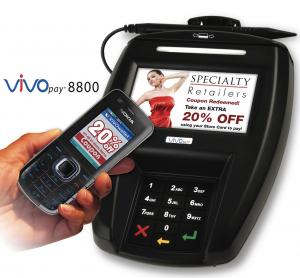Vivotech Eyes Hypercom Assets for Possible Push into POS Market

U.S.-based vendor Vivotech could be making a play for a share of the point-of-sale terminal market and the hoped-for boom in NFC-based mobile commerce at the physical point of sale in the United States.
The contactless reader and NFC software and services supplier disclosed Thursday it has approached point-of-sale terminal vendor VeriFone to acquire the U.S. payment-business assets of Hypercom Corp. VeriFone announced last fall it would divest Hypercom’s U.S. assets following its planned $485 million acquisition of Hypercom, the No. 3 POS terminal vendor. The deal is expected to close during the second half of this year. Update: Ingenico, which will become the second largest terminal maker, is also reportedly in discussions to buy Hypercom's U.S. assets. End update.
VeriFone, which will become the largest POS terminal maker worldwide after it closes the deal with Hypercom, already has a commanding 60% of the U.S. market. And it is hoping to supply many more U.S. merchants with new POS terminals equipped with integrated contactless readers and loaded with payment, loyalty, couponing and other NFC-based m-commerce software. One of its reported customers is Google, which plans to launch mobile advertising and promotions and to enable payment from its Android NFC phones.
That could be a problem for Vivotech, since VeriFone is supplying its own contactless readers for its POS terminals. It had earlier used Vivotech readers and many of the 800,000 contactless readers Vivotech has said it has shipped over the past several years are contacted to VeriFone terminals.
With Hypercom, Vivotech could enhance its own nascent POS terminal business. Vivotech, like VeriFone, also wants to supply sophisticated software for terminals to handle couponing and loyalty programs. Vivotech has been promoting a separate trusted service management business to download and manage payment, as well as loyalty and couponing, applications on NFC phones and terminals. Vivotech also offers an NFC-based mobile wallet.
"We see this as a strategic and transformative opportunity for Vivotech to enhance our next-generation NFC platform and accelerate the adoption of in-store mobile payment, loyalty, marketing and merchandising solutions in the U.S.," said Vivotech CEO Michael Mullagh in a statement on the possible acquisition of the Hypercom U.S. payment assets.
Mullagh was quoted earlier this week as saying Silicon Valley-based Vivotech plans an initial public offering as early as next year.
He predicted the 10-year-old company would finally turn a profit next year. The company has raised $80 million over the years, including funding from such investors as Citigroup, Draper Fisher Jurveston, First Data Corp. and Motorola Ventures.












